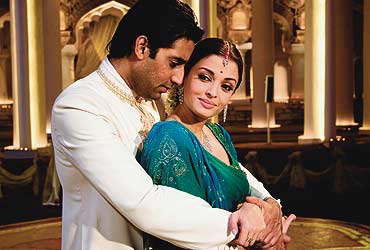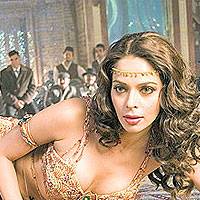Contribute
| Film Review - Guru |
Simran Thadani
01/24/2007
Guru
Dir: Mani Ratnam
Starring: Abhishek Bachchan, Aishwarya Rai, Mithun Chakraborty, R. Madhavan, Vidya Balan
Music: A. R. Rahman
Many of Mani Ratnam’s best-known films paint familiar, essentially human storylines against far-from-formulaic, politically relevant backdrops. Thus Roja (Madhoo) battles the odds to find her abducted husband, Rishi (Arvind Swamy) in Roja – but this is no ordinary kidnapping, because he is being held in Kashmir, with gun-toting insurgents everywhere, and the government does not necessarily want him free. Shekhar (Swamy again) and Shaila (Manisha Koirala) fall in love and elope in Bombay – but their story is told in the context of the acrimonious Bombay riots of 1993. In Dil Se…, Shah Rukh Khan’s Amar is caught between Meghna (Koirala) and Preeti (Preity Zinta) – except that, while Preeti is a regular, bubbly young girl, Meghna is secretly a terrorist. Whether there is a take-home moral or message in any of these films is irrelevant. What matters, filmically, is that these love stories are portrayed against backdrops that have dimension and life of their own.
Guru works a bit differently. It is through and through the story of Gurukant Desai’s meteoric rise to fame and wealth. Make that infamy – and serious wealth, unaffected by lack of capital, experience, connections, or entirely-lawful business processes. One might be of the opinion that the historical setting and biographical narrative style provide enough food for thought beyond the main plot, but the truth is that the character of Gurubhai is so much a larger-than-life cutout on his own that everything else (even the perfectly-sculpted Aishwarya Rai dancing near waterfalls) is secondary by far.
Pity, because, even with Abhishek Bachchan’s extra pounds packed in to represent his character’s advancing years, Guru isn’t a “big†enough human being for this reviewer to truly enjoy the film.
In the first half, Guru is slim, and his story is rousing and exciting. He refuses to work for white men in Turkey because he wants to return to India to start his own business. He stands up to his doubting-Thomas father. He has the wherewithal to trade in kela silk (polyester) at the right time, and to win the hearts of the trade union, find a powerful ally, Manikdas Gupta (Mithun Chakraborty) in the press, and open his own factory. He bosses over his brother-in-law, because he is a genius, a visionary even; and he dotes on his wife (Aishwarya Rai), because he is full of optimism, and because she is the one who seeded his business undertakings. After textiles, he mysteriously diversifies into the petrochemical field, with refineries and factories blossoming all over the country. The shareholders are happy.
This part of the film makes one want to dance in the aisles, because it celebrates the Indian spirit, a dream come true, especially in light of the country’s recent real-life economic success. In fact, the story would be almost unimaginably audacious if it took place at another point in history, and if it weren’t blatantly inspired by that of a real-life Indian business icon (who shall remain unnamed, since all involved continue to deny that connection to the hilt). Gurubhai achieves against all odds. He is impossibly smooth and persuasive. Everything he touches turns to gold. Who wouldn’t want to believe that this dream might come true for other Indians too?
But, to my mind, that same unending quest for success – at any cost – spells the downfall of the character. Guru is now better-dressed, lives in a bigger house, and has a nice car. But all is not right. One by one, and to different degrees of calamity, he falls out with his brother-in-law, his wife, his shareholders, and most importantly, his friend and mentor Gupta... The darker side of Guru’s business comes to the forefront after Gupta’s best editor, Shyam Saxena (Madhavan), decides to expose Guru’s dealings in the press. A war is on, and in the background a drummed chant resonates.
There, for me, the film falters. Perhaps it is the real-life inspiration’s fault – this is, after all, a bio-pic, and real life men are aggressive and unapologetic. Perhaps it is Abhishek’s fault; he tries, but he can’t do the aging Gujarati villager’s inflections or later body language quite right. But perhaps it is also the director’s fault (he is also the scriptwriter, and could have made different decisions). Or perhaps it is just the rather swift and virtually-unannounced change in the film’s tone and pace – no more artistically-picturized songs or idyllic rural shots after a point, no attention paid to the budding romance between Shyam and Meenakshi (Vidya Balan, entirely underutilized). Only ground realities, a more modern, gritty Bombay, and the glowering face of the law. The steep meteoric rise slows down. The hero somehow disappoints as a human being.
I would still recommend the film for its music, for the sparkle of the first half, for the fabulous cinematography, for Madhavan, for Mithunda, and for Ratnam’s talent. I just didn’t walk out of the cinema with the same whole-hearted admiration and support for Gurubhai that I had when he was posing for photographs with the quickly-burgeoning staff of Shakti Industries.
Simran Thadani, 23, hails from Bombay, India. She graduated from Wellesley College in 2005, and watches lots of movies while waiting to hear back from graduate programs in English Literature.
You may also access this article through our web-site http://www.lokvani.com/


